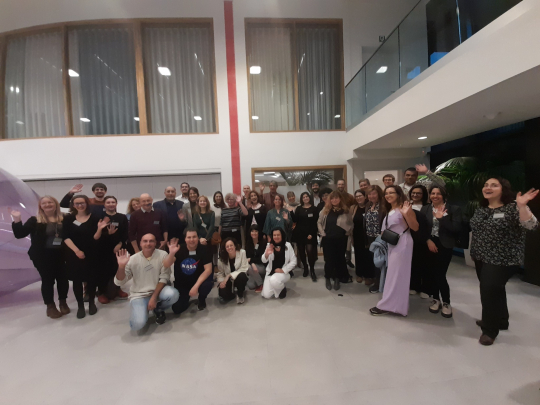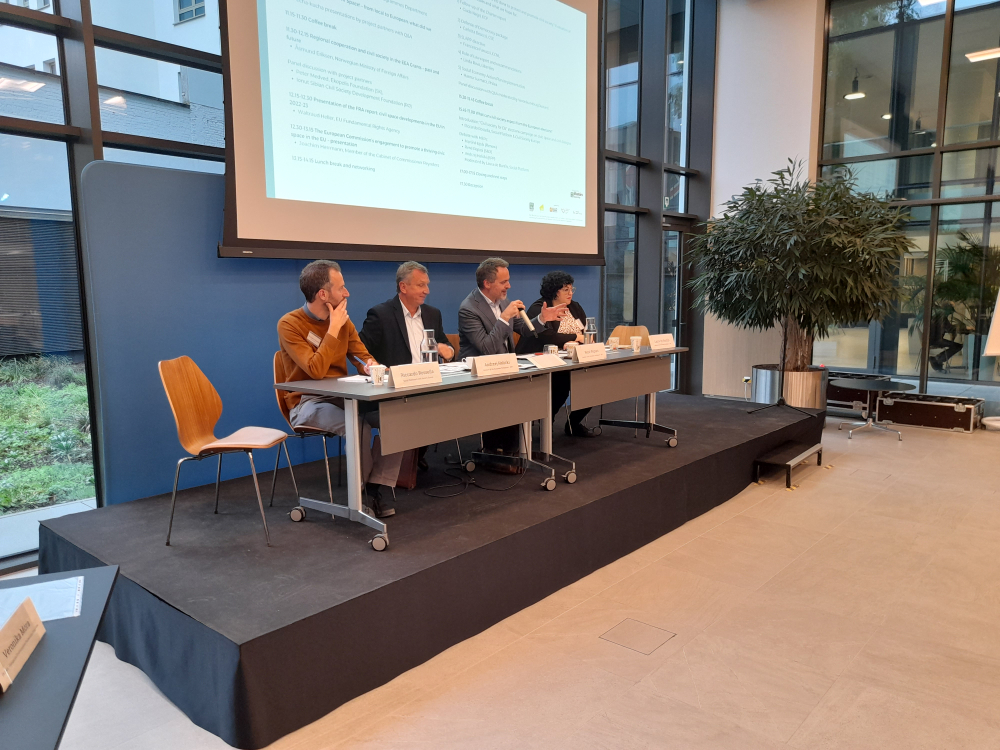
Where do we stand with the European civil society strategy? – was the title of the conference Ökotárs and its partners held on 12 October in Brussels, in the EFTA House. The event, attended by about 60 representatives of civil society organisations from Central Europe, Brussels-based European networks and EU institutions, served a double goal:
- to celebrate the successful conclusion of the 3.5-years long Reclaim Our Civil Space! project supported by the Fund for Regional Cooperation of the EEA & Norway Grants
- to review ongoing European policy initiatives that help defend civil space and discuss about their future perspectives with the help of civil society experts and policymakers.
With such ambitious goals, the agenda was densely packed with presentations and panel discussions also involving the audience.
After the opening remarks of Tori Hoven representing the host, the Financial Mechanism Office, the first session comprised of a series of pecha-kucha presentations by each project partner. For those not familiar with the term: this presentation format originates from Japan (its name meaning ‘chitchat’), and is based on a series of 20 slides each shown (automatically) for 20 seconds, and containing mostly images with little or no text. The speaker has this approximately 7 minutes to deliver his/her presentation against the slideshow’s background. In this way, information sharing is dynamic and digestible even in larger quantities – in this case the 10 presentations covering the activities and achievements in the 8 project countries could provide a broad overview of what happened and with what results (despite that not all of us being proficient in pecha-kucha).

As the project was implemented in the framework of the EEA & Norway Grants, we continued with this topic after the first coffee break. Asmund Eriksen of the Norwegian Ministry of Foreign Affairs detailed why supporting civil society in Europe is an important matter for his country (and the other two donors, Iceland and Liechtenstein) and shared some hopeful new regarding its future continuation. Ionut Sibian of the Romanian Civil Society Development Foundation and Peter Medved of the Slovakian Ekopolis (besides being partners of the ROCS project, both organisations are intermediaries of the EEA & Norway Grants Active Citizens’ Fund, too) reflected on Mr Eriksen’s points and discussed potential improvements to the Grants’ operation.
In the next session we moved to discussing EU and civil society: first Waltraud Heller of the Fundamental Right Agency presented FRA’s latest survey update on civil space in 2023 – this was the first time any audience could hear about the results, just freshly published. Her passionate recounting of the continuing difficulties and obstacles civil society organisations face in many EU Member States was followed by a thorough overview of recent and current policy developments launched by the European Commission, including the Citizens, Equality, Rights and Values funding program and the recently published draft directive on European Cross-border Associations by Joachim Herrmann, member of the Cabinet of Commissioner Didier Reynders.
These policy dossiers were discussed in more detail and from the civil society point of view after lunch by experts of European networks in an all-female panel, more specifically:
- Hanna Surmatz from Philanthropy Europe Association introduced the Social Economy Action Plan and showed how and why it can be useful for philanthropic organisations and broader civil society
- Giada Negri of the European Civic Forum presented the follow-up of the Commission’s December 2022 report on the implementation of the Charter of Fundamental Rights, specifically devoted to civil space
- Carlotta Besozzi of Civil Society Europe talked about the currently discussed Defence of Democracy package, and the potential threats it may have for civil society
- Linda Ravo of the European Civil Liberties Union discussed the annual Rule of Law Report and cycle, and how civil society can give input to and use the output of this instrument
- Francesca Fanucci from European Centre for Not-for-Profit Law gave an overview of the status of the SLAPP directive, aiming to defend civil society and journalists against the malignant impacts of Strategic Lawsuits Against Public Participation.
The last session of the day looked towards the future, that is, the European elections coming up next June. First Riccardo Rossella of the Social Platform introduced the manifesto and the aims of the coordinated European civil society campaign – its main demands being the adoption of a civil society strategy and an agreement on civil dialogue. Members of the two largest political groups in the Parliament: Andrzej Halicki of the European People’s Party and prof. René Repasi from Socialists & Democrats then reflected on these asks and talked about their group’s views and attitudes towards civil society.
The conference day ended informally, with a dinner to celebrate the successful conclusion of the Reclaim Our Civil Space! project. However, the work started under this umbrella will continue both on the national level helping build civil society capacity in Central Europe and on the European, advocating towards a comprehensive civil society strategy. While is hard to summarise the day’s lessons in a few sentences, one thing was clear: there is a growing understanding and concern about shrinking civil space and its consequences in the EU, and much has been done by the institutions to counter the trend both in terms of monitoring, engagement, funding and legislation. However, there is still “unfinished business”, important steps to be taken until and beyond the elections in 2024. Civil society must remain vigilant and active to see these ongoing initiatives through their actual realisation and practical impacts.
Please find attached the following presentations from the conference:












